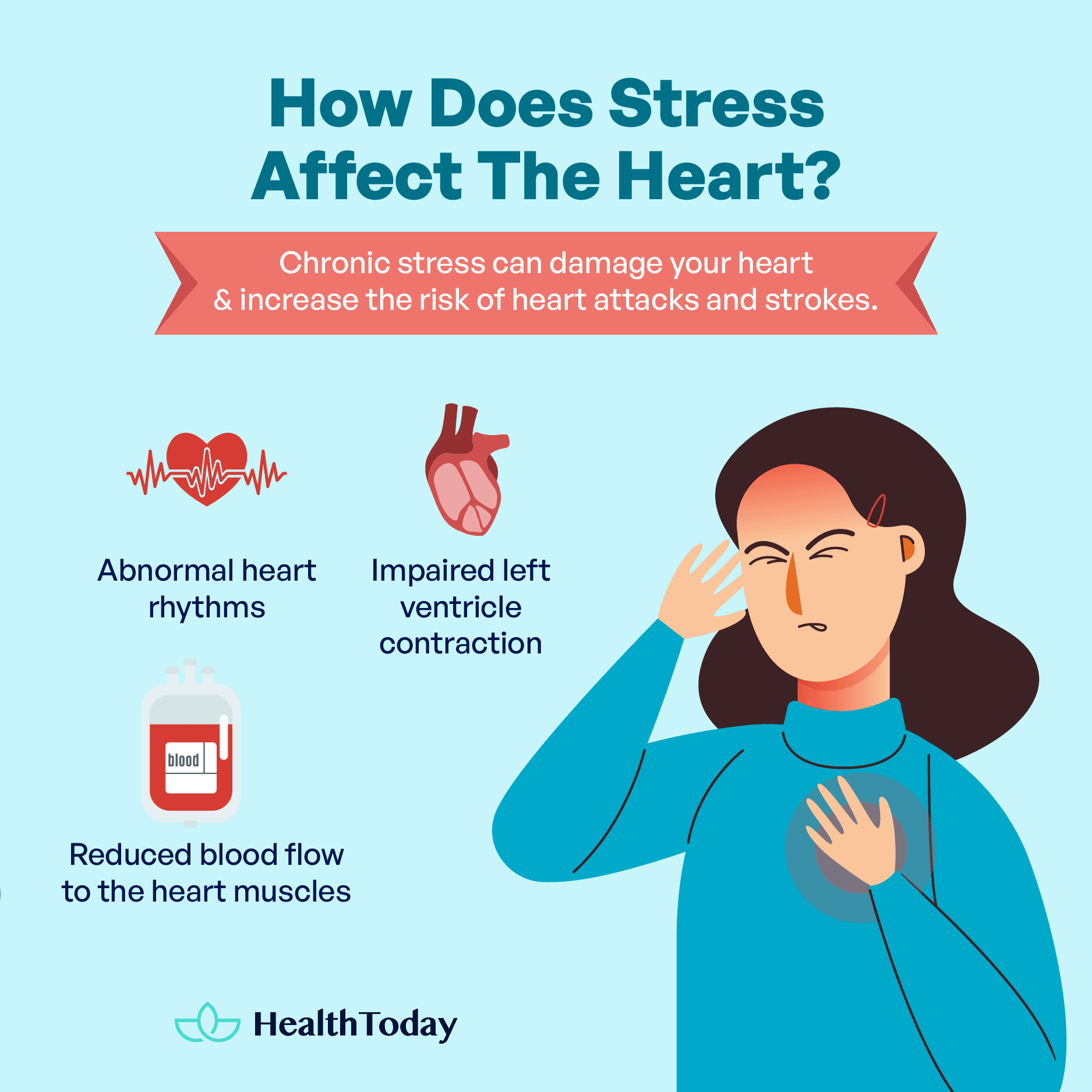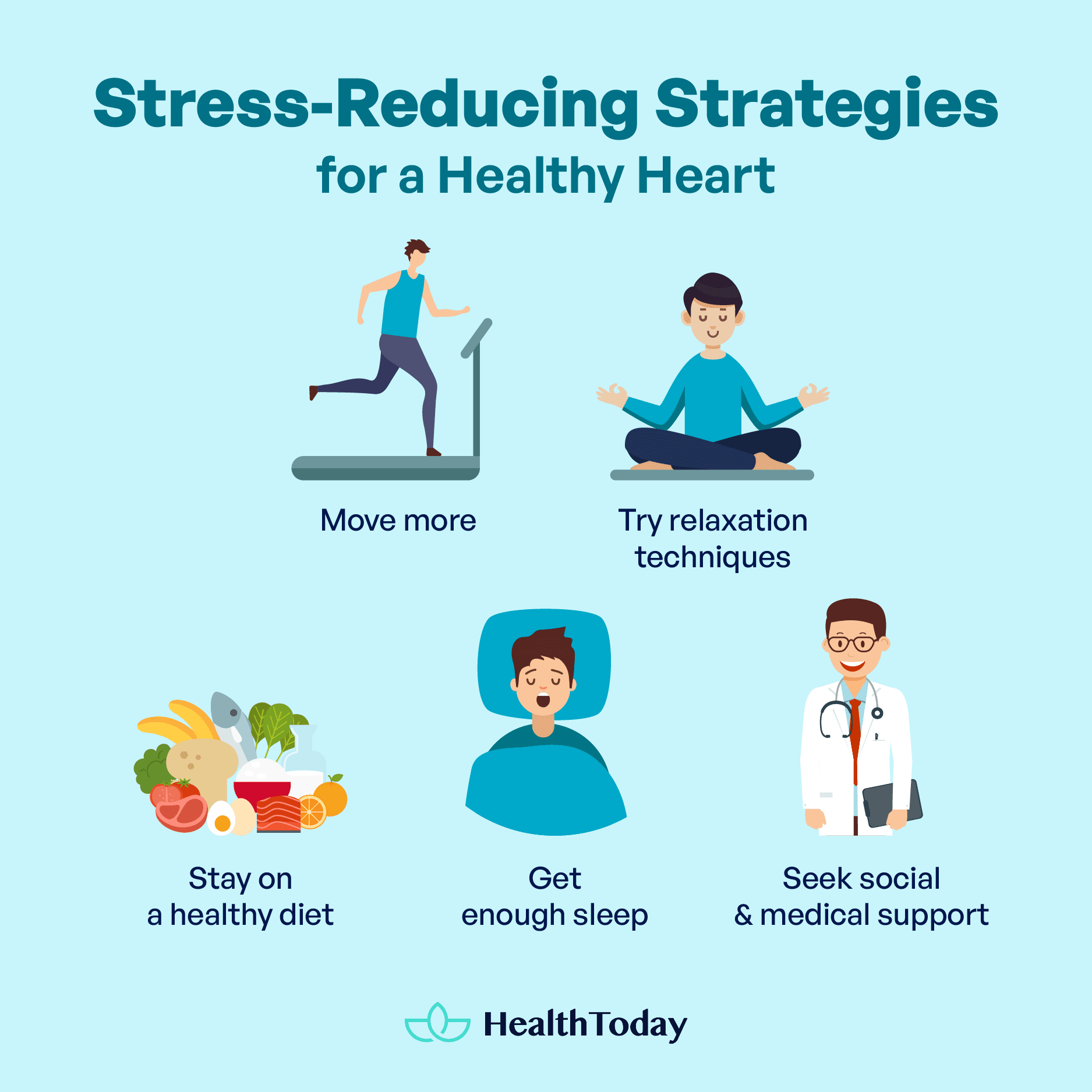Table of Contents
We may have experienced overwhelming stress that makes our hearts skip a beat. But what if the effects of stress on the heart go beyond a simple palpitation?
Buckle up as we dive into the intricate web of stress and heart attack, with underlying factors like hormones and brain signals. Along the way, we’ll equip you with practical tips to conquer stress for your heart’s well-being. Plus, let’s explore the heartbroken symptoms and discover if our hearts can explode.
Can stress cause heart problems? The underlying connections
In ancient times, the heart was considered the source of emotions, including stress. However, in the 17th century, they discovered that feelings stem from the brain. That’s when people realized that the heart was just a metaphor (1).
Our ancestors had a point when they believed emotions were connected to the heart. When stressed out, some may feel their heart pounding.
If it keeps throbbing, what does stress do to your heart over time? Plus, can stress cause heart disease?

Effects of stress on the heart: Your brain matters
Stress is how our brain and body react to a challenge or demand (2).
We all get stressed sometimes. Not all stress is bad, but sometimes it can be a lifesaver in a dangerous situation (2, 3).
Here’s an everyday scenario: You face a tight deadline for school or work, and stress creeps in. That stress can sharpen your thinking and motivate you to focus on getting things done. That stress disappears once you wrap it up (2, 4).
Sometimes, the stress doesn’t fade away and becomes chronic, sticking around for weeks, months, or even longer, which might be resulted from (2):
- Everyday stressors from school, work, family, financial problems, and other regular pressures that don’t break off
- Sudden, difficult changes such as divorce, job loss, or other unfortunate events that throw you off balance
- Traumatic stress owing to life-threatening situations like a severe accident or natural disasters
Chronic stress can harm your heart health, especially if you have pre-existing heart conditions (5).
For example, suppose someone has stress-induced ischemia (reduced blood flow). If that person also has coronary heart disease, they can be at a two-fold higher risk of a heart attack or cardiovascular death than those without ischemia (6).
So how does chronic stress affect the heart? It can rev up your heart rate and blood pressure, speed up your breathing, and tense your muscles (7).
These reactions can be traced back to an almond-shaped brain part called the amygdala. Typically, the amygdala helps process emotions related to fear and stress (7, 8).
Scientists have found an increased risk of heart disease in those with the amygdala more vigorously activated by stress (9).
In other words, the amygdala sends distress signals to the hypothalamus, stimulating the pituitary and adrenal glands. This hypothalamic-pituitary-adrenal (HPA) axis sets off a cascade of hormonal secretions, gearing you up to fight back or flee (7), called the ‘fight-or-flight’ response.
Two important hormones in this defensive response are cortisol and epinephrine, also called adrenaline (2, 7, 10).
Continuous releases of stress hormones without real danger can narrow your blood vessels and arteries. Thus, the heart will work harder to pump blood, causing an increased heart rate (7, 10, 11).
Over time, having a consistently high level of these hormones can cause (1, 10):
- Sustained high blood pressure
- Inflammation in your arteries
- Increased body fat
- Difficulty using insulin (insulin resistance)
All these effects can trigger plaque buildup and disease in your arteries. As a result, they increase the risk of having a heart attack or stroke (1).
The stressful heart: How does stress affect the cardiovascular system?
Life in the modern era comes with its fair share of stressors, including financial burdens and the constant assault of loud noise. Unfortunately, these stressors can have serious heart consequences and potentially shorten our lives (1).
A study found that people who live in poorer neighborhoods or areas with more crime have more heart disease. It can be due to high stress levels in these areas (12).
Furthermore, intense stress can result in temporary heart complications like:
- abnormal heart rhythms (arrhythmias)
- impaired left ventricle contraction
- reduced blood flow to the heart muscles (myocardial ischemia)
Although short-lived, these problems can be highly detrimental and sometimes even fatal (5).
Another concern is stress can trigger hyperventilation (HVS), in which you breathe quickly and deeply. In this case, you may be more prone to experience chest pain (13).
But long-term stress may also indirectly impact your heart. Simply put, its downstream effects can be a risk factor for heart disease:
- Poor dietary choices: Cortisol may make you want to eat more to get extra energy. People with stress may also prefer unhealthy foods and overeating (1, 7, 14).
- Substance abuse: Some handle stress by using alcohol, cigarettes, or other substances. These unhealthy ways of coping can account for roughly one-third of the connection between work stress and heart disease (14, 15).
- Difficulty sleeping: This is triggered by high-stress hormone levels, which can interfere with sleep patterns. Short and long sleep durations are predictors or markers of cardiovascular outcomes (11, 16).
- Lack of physical activity: Stress is considered a barrier to physical activity, thus generating sedentary behavior (3, 17).
- Have diabetes or be overweight: Insulin resistance and weight gain caused by stress can trigger these conditions (1, 7).
Stress and heart attack: What research shows?
A heart attack, or myocardial infarction, is a life-threatening situation. In the US alone, over 800,000 individuals go through this alarming experience each year (18).
Heart attack goes hand in hand with the formation of blood clots that block one’s blood flow to the heart muscle (8), which is attributed to plaque disruption, causing blood platelets and other substances to form a clot.
If blood flow isn’t restored quickly, the heart muscle may die due to a lack of oxygen (1, 19).
Most heart attacks occur with a pre-existing condition called coronary artery disease. Its symptoms can be mild to severe (8, 20):
- Chest pain, heaviness, or discomfort, which is the most common symptom
- Shortness of breath, sometimes it is the only symptoms
- Pain or discomfort in the upper body, including your back, shoulders, arms, neck, jaw, or above belly button
- Palpitations or the feeling of a pounding heart or irregular heartbeat
- Feeling unusually tired, sometimes for days (this is more common in women)
- Heavy sweating for no reason
- Nausea, vomiting, and fainting
- Light-headedness or sudden dizziness
If you have any doubt about the symptoms, it’s safe to call 9-1-1 immediately. Every minute matters in a heart attack (20, 21).
The direct trigger of a heart attack isn’t always known. Yet there are well-known risk factors. Stress is one of them, especially from upsetting events (8, 14).
It seems that stress can act as a catalyst for heart attacks by raising blood pressure, heart rate, and inflammation (14).
So, can stress alone cause a heart attack? In fact, it’s not that simple.
A heart attack caused by stress primarily affects those with existing coronary heart diseases. The attack typically results from a combination of factors, including lifestyle choices, genetics, pre-existing cardiovascular conditions, and some health conditions (14, 20).
However, it’s not like a plaque disruption happens suddenly. Plaque may take years to build up in your arteries (22).
Acute stress helps with dangerous situations through the ‘fight-or-flight’ response. Chronic stress can damage your heart by increasing blood pressure and promoting inflammation and plaque buildup in your arteries. Consequently, this can amplify the possibility of heart attacks and strokes.
Symptoms of a broken heart
When referring to a ‘broken heart,’ people often mean the emotional pain or grief associated with the death of a loved one, a break-up or divorce, betrayal, or romantic rejection.
However, a real-life broken heart—triggered by emotionally stressful events—can cause heart problems and be confused with a heart attack. Yet this syndrome has no evidence of blocked heart arteries (23, 24).
Broken heart syndrome weakens the left ventricle, the main pumping chamber of the heart. The syndrome can also be called ‘Takotsubo cardiomyopathy’ or ‘stress-induced cardiomyopathy’ (19, 23).
The term ‘tako-tsubo’ comes from the Japanese name for octopus traps, which resemble the pot-like shape of the affected heart (23).
Here are some physical heartbreak symptoms (19, 23):
- Chest pain—the main symptom, also called angina
- Difficulty breathing, another major symptom
- A heavy or tight feeling in the chest
- Abnormal heartbeats (arrhythmias)
- Suddenly very tired, sweaty, or dizzy
- Digestive issues, e.g., stomach pain, nausea, or loss of appetite
- Cardiogenic shock, where a weakened heart suddenly can’t pump enough blood around
As symptoms of broken heart syndrome are pretty similar to that of heart attack, seek emergency support when you notice them. They can cause severe heart muscle failure (23).
Over 90% of the reported cases happen to women aged 58‒75. Unfortunately, this syndrome can occur to anyone, even if you are in good health. Its prevalence seems to rise every year (19, 23, 24).
Fortunately, broken heart syndrome is treatable.
In rare cases, this condition can be fatal. Most people recover fully within two months and are unlikely to have it happen again (19, 23).
‘Broken-heart syndrome’ is not just a metaphor for emotional pain; it can manifest as heart problems. Some symptoms like chest pain and difficulty breathing can be mistaken for a heart attack. Most people bounce back fully within months.
Can your heart explode?
The heart does not explode under normal circumstances. The idea of a heart “exploding” is more of a metaphorical or exaggerated expression rather than a literal occurrence.
However, the heart can go through a rupture.
A severe complication called left ventricular (LV) rupture can happen during a heart attack. Yet it is rare (occurring in less than 1% of cases). Common symptoms are chest pain, fainting, and bulging neck veins (25, 26).
Urgent surgical intervention is vital. If left untreated, LV rupture can be fatal (25).
Some risk factors of LV rupture are (25, 26):
- In older adults and those with leukocytosis, an elevated number of white cells in the blood
- Woman
- Facing stress and trauma
- Having infections
- Having malignancies
- Having high blood pressure
Best ways to reduce stress and improve heart health
Once you reduce your stress levels, you’ll notice a positive impact on your body. Inflammation goes down, blood pressure stabilizes, and insulin sensitivity improves, all of which are beneficial for tackling heart diseases (1).
Even if you’re dealing with coronary artery disease, some simple adjustments can help reduce the risk of stress-induced heart attack (22).
Finding the best practical methods that work for you is a personal journey. Here we provide some suggestions that work well for anyone.

Move more
Physical activity is an easy way to ease stress and improve your mood, caused by releasing the ‘happy’ hormone endorphins (14, 27).
Daily walking for 30 minutes can help you feel better and boost your immune system (2).
As the experts suggest, each week, aim for at least (28):
- 150 minutes of moderate-intensity aerobic activity
- 75 minutes of vigorous-intensity aerobic activity
Note that 1 minute of vigorous exercise equals 2 minutes of moderate-intensity exercise (28).
Pick activities that bring you joy. It’s not about how intense it is but how consistent you are. Make it easy and fun to establish a lasting habit.
Also, try those movement therapies—like yoga, tai chi, and qi gong. Their smooth movements, deep breathing, and mental focus will help you feel at ease and calm (7).
Try relaxation techniques
Make sure to carve out time for activities that bring you genuine pleasure. Whether it’s getting lost in a great book, expressing yourself through art, or enjoying the beauty of the outdoors, the key is to prioritize what brings you joy.
Some specific techniques also help manage stress and lower your blood pressure. Examples are deep abdominal breathing exercises, meditation, mindfulness, and yoga (3, 7, 29).
Some less common techniques—yet not less effective—are practicing gratitude, visualization, or reciting positive affirmations (7, 30, 31).
Fortunately, many free apps can help you relax and meditate. You can opt for an app or wellness program with breathing, meditation, or muscle relaxation exercises (2).
Stay on a healthy diet
Instead of providing a list of what and what not to eat, you should center on consuming healthy foods consistently (32).
The rules of thumbs are (32):
undefinedundefinedundefinedundefinedundefinedundefinedundefined
Get enough sleep
Being stressed can make sleeping harder, and not sleeping enough can worsen stress (3).
It’s ideal to sleep for 7-8 hours each night. You should also prioritize good sleep habits, which may include (3):
- A cool, dark, and quiet room
- A relaxing bedtime routine
- No exercise close to bedtime
- Avoid eating, drinking, or having your eyes glued to the screen in the hours before bedtime.
Establishing a consistent sleep schedule will be the best in the long run (2).
Seek social and medical support
Strong social connections can provide a sense of belonging and help manage stress. Thus, stay connected with your loved ones and seek support when needed (7).
In some harsh situations, some may feel like they can’t cope. Talking with friends and family or finding a supportive community may help (14)
Consider talking to a professional counselor when you have severe symptoms of stress for two weeks or more, including (2, 14):
- Having trouble sleeping
- Losing interest in things you usually enjoy
- Changes in your eating, which cause unwanted changes in your weight
- Having trouble getting out of bed because of your mood
- Difficulty focusing your thoughts
- Not being able to do your usual daily activities
- Use drugs or alcohol more often than usual
Can a teenager have a heart attack from stress?
Teenagers can experience heart attacks, although it’s uncommon. About 10% of all patients are under 40 years old. However, the number of this population is gradually rising each year. It can be due to lifestyle factors such as being overweight, using substances, being inactive, or eating poorly.
Can emotional stress cause heart problems?
In response to emotional distress, potent hormones like cortisol and adrenaline circulate in your body. These stress hormones can upsurge your blood pressure and heart rate. That’s why stress can increase the odds of developing heart disease if it doesn’t disappear.
What are the heart-related signs of stress?
Common heart-related signs of stress are a faster heart rate and higher blood pressure. These changes are usually related to hormonal shifts. Chest pain or discomfort is another common heart sign of stress, yet it can also be a symptom of other medical conditions.
What does stress-induced heart pain feel like?
The pain can vary from mild to severe. It can feel like a tight band around or like something heavy sitting on your chest. Some may feel like they have bad indigestion or burning. The pain can last longer than 20 minutes and may radiate from the chest to other body parts.
How much stress does it take to cause a heart attack?
Stress alone does not directly cause a heart attack, so there is no clear threshold. If there is, it will vary depending on various factors—some critical factors, including your overall health, risk factors, and stress-coping ability.
Summary
You may now have the answer to the question: Does stress cause heart attacks? Although it does not directly cause a heart attack, chronic stress can be a risk factor.
Effects of stress on the heart include triggering artery inflammation and building up plaque due to hormonal changes. They may all heighten your risk of cardiovascular disease and heart attack.
Heartbreak is a real medical condition. The main heartbroken symptoms are chest pain and difficulty breathing.
Reducing stress isn’t a piece of cake. It requires work and persistence, but it is a vital step to safeguard your heart health. Remember to focus on what you did accomplish each day, not what you can’t do.

















Comments
0